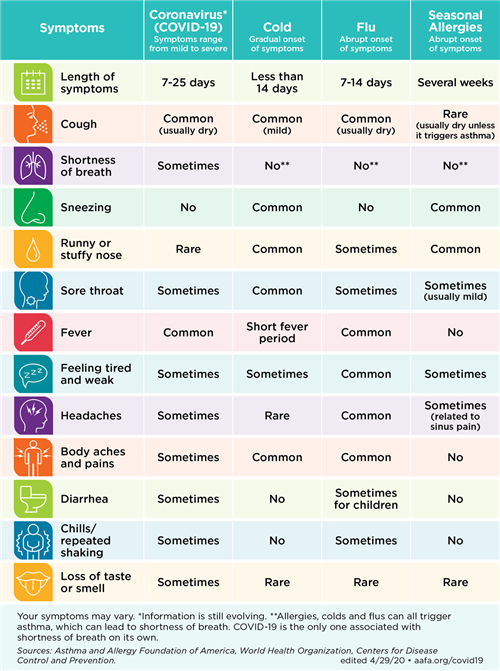-

Angelica Montanez BSN, RN, CSN
Patten School Nurse
tel#(732) 376-6050 ext 25416
fax# (732) 347-8954
Angemontanez@paps.net
For All Incoming Kindergarten and New Students
Para todos los alumnos de kínder y nuevos estudiantes entrantes
Vaccine Requirements for K - 12 Students
Requisitos de vacuna para niños desde el nacimiento hasta los 6 años.
Requisitos de vacuna para niños de 7 a 18 años.
Reduce the Risk of COVID-19
Helping Children Cope With Changes Resulting From COVID-19 English
Helping Children Cope With Changes Resulting From COVID-19 Spanish
VEA A CONTINUACIÓN LA TRADUCCIÓN AL ESPAÑOL.
Winter 2021-2022
EJ Patten Elementary School

Cold, Flu, or Allergy?
Treatment depends on which you have. A health professional can help you choose the best therapy.
Common Cold
- Symptoms last up to 2 weeks
- Stuffy, runny nose; sore throat; cough
- Treated with rest, fluids, over-the-counter (OTC) medicines to ease symptoms
Seasonal Flu
- Symptoms usually last 1-2 weeks
- High fever (100-102 °F, or higher in youngsters), headache, aches, and pains, weakness, exhaustion, cough, chest discomfort
- Treated with rest, fluids, OTC medicines, prescription antiviral drugs
Airborne Allergy
- Lasts as long as allergens (such as pollen, pet dander) are present
- Stuffy, runny nose; itchy, watery eyes
- Treated with antihistamines, decongestants, nasal steroids
Links
- PAPS CORONAVIRUS INFORMATION https://www.paps.net/site/default.aspx?PageType=3&DomainID=4&ModuleInstanceID=12106&ViewID=6446EE88-D30C-497E-9316-3F8874B3E108&RenderLoc=0&FlexDataID=38515&PageID=1
- Flu: NIH Health Information
- Flu.gov(link is external) (HHS)
- Common Colds
- Catching a Cold When It’s Warm
- Pollen
- Seasonal Allergies
Lice
At any time of year, we get a few cases of lice. Adult head lice or their eggs (nits) are found in the hair, most often behind the ears and at the base of the neck. Head lice are most commonly spread by direct head-to-head contact with the hair of other people who have head lice. Head lice are less commonly spread through contact with an infested person’s personal items, such as hairbrushes and combs, hats, unwashed clothing, bedding or towels. Head lice are commonly spread within households. There are a number of effective treatments for head lice. Treatment for head lice usually consists of shampooing the hair with a medicated shampoo. Consult with your pediatrician for treatment of head lice. Head lice are certainly a nuisance, but they are not generally considered a health hazard. Head lice are not a health hazard or a sign of poor hygiene and are not responsible for the spread of any disease.
Screenings
Vision, hearing, blood pressure, and height/weight screenings are in process at EJ Patten School. Notes will be sent home for students that have difficulty with any of the screenings. Please let us know if your child was seen by the eye doctor if your child received a note about their vision and the results of the exam. Because vision can affect learning, it is important that students who need glasses wear them while in school. If you need assistance in finding an eye doctor or financial assistance for glasses please let us know. Please let the nurse know the results of hearing evaluations if your child received a note regarding their hearing. Notices will also be sent home regarding any deviations from the normal ranges in height, weight, or blood pressure. Please be sure to bring these notes to your pediatrician so that these concerns can be addressed.
If your child has outgrown their uniforms,
please consider donating them to our school. We especially need PANTS in all sizes.
Extra clothes come in handy for when
students fall in a puddle at recess or spill
water or milk on themselves at lunch. Thank you.
Here are some more useful links:
When To Keep Your Child Home https://www.paps.net/site/handlers/filedownload.ashx?moduleinstanceid=35974&dataid=27214&FileName=Guidelines%20for%20Keeping%20Sick%20Children%20Home%20From%20School.pdf
Immunization Requirements https://www.paps.net/cms/lib/NJ01001771/Centricity/Domain/188/Minimum%20Immunization%20Requirements.pdf
Medication Administration Form https://www.paps.net/site/handlers/filedownload.ashx?moduleinstanceid=35971&dataid=27771&FileName=Medication%20Administration.pdf
Universal Physical Form https://www.paps.net/site/handlers/filedownload.ashx?moduleinstanceid=35971&dataid=27766&FileName=ch-14.pdf
Asthma Action Plan https://www.paps.net/site/handlers/filedownload.ashx?moduleinstanceid=35971&dataid=27761&FileName=Asthma%20Action%20Plan.pdf
Food Allergy Part One https://www.paps.net/site/handlers/filedownload.ashx?moduleinstanceid=35971&dataid=27762&FileName=food%20allergy.pdf
Seizure Action Plan https://www.paps.net/site/handlers/filedownload.ashx?moduleinstanceid=35971&dataid=27764&FileName=seizure%20action%20plan.pdf
More forms and information are available at: https://www.paps.net/Page/17311
Angie Montanez BSN, RN, CSN
Email: angemontanez@paps.net
P: 732-376-6050
ext# 25416
F: 732-347-8954
Invierno 2020-2021
Escuela Primaria EJ Patten
Resfriado, gripe o alergia?
Angie Montanez BSN, RN, CSN
El tratamiento depende de cuál tenga. Un profesional de la salud puede ayudarlo a elegir la mejor terapia.
Resfriado comun
Los síntomas duran hasta 2 semanas.
Congestión nasal, secreción nasal; dolor de garganta; tos
Se trata con reposo, líquidos, medicamentos de venta libre (OTC) para aliviar los síntomas.
Gripe estacional
Los síntomas generalmente duran 1-2 semanas
Fiebre alta (100-102 ° F o más en los jóvenes), dolor de cabeza, dolores y molestias, debilidad, agotamiento, tos, molestias en el pecho
Tratado con reposo, líquidos, medicamentos de venta libre, medicamentos antivirales recetados
Alergia Aerotransportada
Dura tanto como los alérgenos (como polen, caspa de mascotas) estén presentes
Congestión nasal, secreción nasal; ojos llorosos y con picazón
Tratado con antihistamínicos, descongestionantes, esteroides nasales.
Campo de golf
Gripe: información de salud de los NIH
Flu.gov (el enlace es externo) (HHS)
Resfriados comunes
Coger un resfriado cuando hace calor
Polen
Alergias estacionales
Piojos
En cualquier época del año tenemos algunos casos de piojos. Los piojos adultos o sus huevos (liendres) se encuentran en el cabello, con mayor frecuencia detrás de las orejas y en la base del cuello. Los piojos se transmiten más comúnmente por contacto directo de cabeza a cabeza con el cabello de otras personas que tienen piojos. Los piojos se transmiten con menos frecuencia a través del contacto con artículos personales de una persona infestada, como cepillos para el cabello y peines, sombreros, ropa sin lavar, ropa de cama o toallas. Los piojos se propagan comúnmente dentro de los hogares. Existen varios tratamientos efectivos para los piojos. El tratamiento para los piojos generalmente consiste en lavar el cabello con champú medicado. Consulte con su pediatra para el tratamiento de los piojos. Los piojos son ciertamente una molestia, pero generalmente no se consideran un peligro para la salud. Los piojos no son un peligro para la salud o un signo de mala higiene y no son responsables de la propagación de ninguna enfermedad.
Proyecciones
Los exámenes de visión, audición, presión arterial y altura / peso están en proceso en la Escuela EJ Patten. Se enviarán notas a casa para los estudiantes que tengan dificultades con cualquiera de las evaluaciones. Infórmenos si el oculista vio a su hijo si recibió una nota sobre su visión y los resultados del examen. Debido a que la visión puede afectar el aprendizaje, es importante que los estudiantes que necesitan anteojos los usen mientras están en la escuela. Si necesita ayuda para encontrar un oculista o asistencia financiera para anteojos, infórmenos. Informe a la enfermera los resultados de las evaluaciones de audición si su hijo recibió una nota sobre su audiencia. También se enviarán avisos a casa sobre cualquier desviación de los rangos normales de altura, peso o presión arterial. Asegúrese de llevar estas notas a su pediatra para que se puedan abordar estas inquietudes.
Si su hijo ha superado sus uniformes,
por favor considere donarlos a nuestra escuela. Necesitamos especialmente PANTALONES en todos los tamaños.
La ropa extra es útil para cuando
los estudiantes caen en un charco durante el recreo o derrame
agua o leche en el almuerzo. Gracias.
Email: angemontanez@paps.net
P: 732-376-6052Ext# 25416
F: 732-347-8954
Select a School...
Select a School
- Ignacio Cruz E.C.C.
- School #7 E.C.C.
- Edmund Hmieleski Jr. E.C.C.
- Anthony V. Ceres Elem
- James J. Flynn Elem
- Edward J. Patten Elem
- Dr. Herbert N. Richardson Elem
- Robert N. Wilentz Elem
- Rose M. Lopez Elem
- Dual Language School
- Samuel E. Shull MS
- William C. McGinnis MS
- Perth Amboy High School
- Freshman Academy at PAHS
- Personalized Learning Program at PAHS

